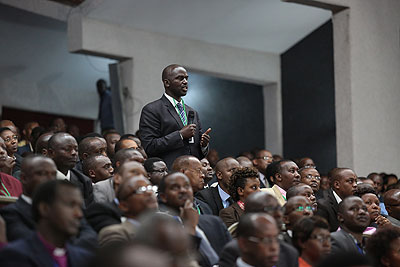Editor, Refer to the story, “Umushyikirano resolves to improve service delivery”, (Sunday Times, December 8).


Editor,Refer to the story, "Umushyikirano resolves to improve service delivery”, (Sunday Times, December 8).I am deeply grateful to the Government of Rwanda’s endeavour for reaching out to all the citizens. With Umushyikirano (National Dialogue Council), we have a great opportunity to engage our leaders in mutual discussions that lead to the development of our country.Live streamlining Umushyikirano is yet another reason why I feel proud and lucky to be Rwandan, and to have President Paul Kagame and his team at the frontier of our quest to become a better and more prosperous nation. I salute the President for putting the masses’ interests and opinions at the centre of national policies through countless consultative platforms.Upon close observation of the past three national dialogues, I think it is about time the Umushyikirano is decentralised to districts, provinces and other institutions of both public and private sector interests.
The annual dialogue, chaired by the President, can be maintained as a platform for the highest level consultations and appeals platform for issues raised and unresolved at the district and province ‘dialogues’. My argument is based on the following reasons:1. It seems that many issues are reserved for a very long time until the year-end dialogue for them to be aired and addressed, yet they could have been dealt with way before-hand through ‘smaller dialogues’ at, say, the district or provincial level. To fast-track their resolutions, people should have a chance to settle them at the lower levels. This is partly because some leaders seem unaware of these issues until they surface at the year-end national dialogue.2. Not all the problems are resolved due to the limited time that the annual Umushyikirano is accorded and yet there may be more constructive issues that miss out due to the time factor. For example, smaller issues at the district level can be handled by a dialogue chaired by the governor, and sector level issues addressed by sessions chaired by district mayors.3. Today, Rwanda Broadcasting Agency (former Orinfor) has many community radio stations which could facilitate locals to directly call in or text their respective concerns and contributions, thus covering populations beyond the ones that are physically present at the venues of the dialogues.
This will increase ownership and involvement by the respective constituents and thus result in addressing issues in detail and ensure effectively follow up on agreed actions – with the involvement of people and all the other stakeholders. This would allow local leaders to win their people’s confidence.Decentralised dialogues would force leaders to do their best to address issues on time, or else they will be exposed at the year-end session chaired by the President himself.Jackson Mugabo, Kigali


